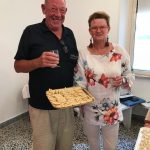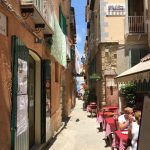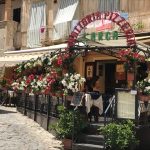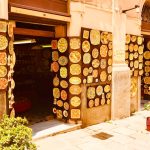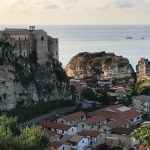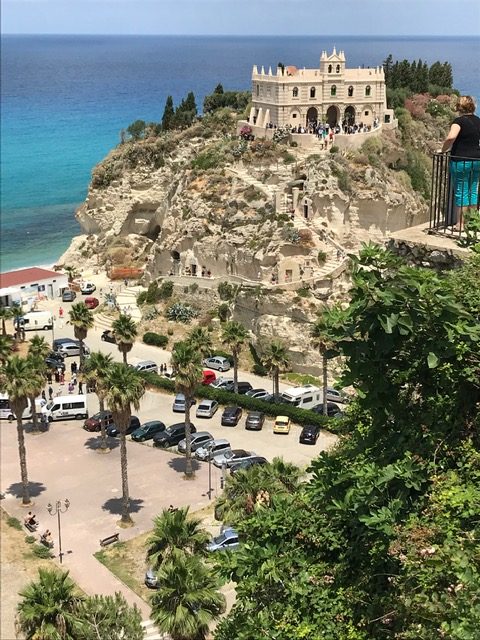
A Pasta Recipe with a Difference
A malfunctioning GPS, a pet shop and a small coastal town in southern Italy were the unlikely ingredients for our authentic Calabrian cooking class.
Take a little-known coastal area in Southern Italy and a malfunctioning GPS and stir together. Add a (large) pinch of male reluctance to ask directions. Add a pet shop and a chance encounter with a language tutor, and combine. When cooked you get an unplanned but fun filled night at an authentic cooking school in one of the most picturesque places in Calabria.
Bruce and I were driving north from the port of Villa San Giovani after bringing our hire car across on the ferry from Sicily to mainland Italy. Well, to be precise, Bruce drove and I screamed. It’s the roads, you see. The Italians seem to think nothing of building a bridge to connect two high peaks. Why drive through a valley and tunnels when you can zip along at a minimum of 130 kilometres an hour hundreds of metres above the valley below? And, of course, there’s also the unlimited photo opportunities. Even on the narrowest of roads it’s not uncommon to come around a corner to find an Italian motorist stopped dead in front of you to get a shot of the amazing view. And, of course we won’t even mention the fact that Italians seem to drive on the basis that road rules and line markings are mere suggestions.
What language barrier?
We were looking forward to our first visit to southern Italy. We’d booked a local villa as an Airbnb in the historic fortified city of Tropea on the Costa Degli Dei (The Coast of the Gods) and had arranged to meet the owner there in the early afternoon. It was all done by email and with the marvels of Google translate – just as we had done in many countries in the past, including Italy. The so-called language barrier had never been a barrier at all. Until this day.
We weren’t that far from our destination when the GPS unexpectedly told us to turn off the main road. We weren’t locals so who were we to question the instructions. Obviously, the GPS knew better than us. It turned out it didn’t.
Over the next few hours we were taken through remote villages where the streets were so narrow we had to do a three-point turn at almost every corner. We bumped along narrow tracks through the middle of local farms, olive groves and orchards while bewildered workers just scratched their heads, shaded their eyes and waved. We passed hillside ruins, paddocks of grazing sheep and farmhouses surrounded by stone walls. We held our breath as we crossed streams and creeks where swaying wooden bridges did nothing to improve our confidence. As the car’s GPS took us one way and then the next, constantly “recalculating”, I tried to get a better take on our location by using Google Maps on my iPad. No chance. There was no internet reception.
Tropea … a beautiful sight for many reasons
Eventually we saw the outskirts of Tropea and its towering walls. As we looked out to unbelievably brilliant blue seas we gasped at the sheer beauty and history in front of us. It was enough for us to forget the stress, frustration and tenseness of the past few hours. But it was short lived. As we entered the town and headed for our accommodation it was obvious that our GPS was still malfunctioning. At least we now had internet reception but even Google Maps couldn’t find the address we’d been given.
By this stage we were well past the appointed meeting time so I called our host Vittorio to explain, only to quickly discover that he didn’t speak a word of English – and my few words of Italian were useless against his rapid fire local dialect. So around and around we went. I called Vittorio again to see if perhaps he had learnt English since our last one-sided conversation. It seemed he hadn’t so around and around we continued, a few times getting close to success, only for our hopes to be dashed with yet another “recalculating”.
Getting Help (I mean Directions)
On some of the many, many times we passed along the same strip of local shops, I gently suggested to Bruce that we stop and try to get help. I wasn’t suggesting that we actually ask for directions. No, I definitely was not suggesting that we ask for directions. Definitely not. Just help. There’s a difference, you know. Getting help is not the same as admitting you’re lost and need directions.
We knew the villa was within walking distance of the shops so we knew we were frustratingly close. Eventually, Bruce reluctantly agreed to stop and he double parked while I went looking for the help (and the not-to-be-mentioned directions) we desperately needed. We were now several hours late and were facing the distinct possibility that we wouldn’t find our accommodation.
It took me a few minutes to find the right combination of a shop that was open and had people inside: not an easy task late on a summer afternoon in southern Italy. It was a pet shop but I had no time to think about cuddly friends. With a combination of hand signals, facial gestures and apologies from both sides – “Sorry no English” … “Sorry no Italian” – it was soon obvious that it wasn’t the place to get directions. I mean find help.
And then in he walked. The staff and customers both launched at the young man in rapid Italian, pointing at us, waving hands, shaking heads, more pointing. And then he spoke to me – in perfect English. His name was Nicola, he was a local and he would fix the problem. I did as he instructed and raced to the car to get Bruce and our mobile phone.
Catching Up with Old Friends
Nicola dialled Vittorio’s number and had what seemed to be a very long and animated conversation which I worried must indicate a problem. But that wasn’t the case. As Nicola explained when he finished the call, it was simply that they knew each other. They wanted to catch up on what each had been doing lately, to check on each other’s family, to talk about the weather and a bit of local news. Oh, and yes, our problem. We should wait with Nicola, Vittorio would drive his motor cycle to the pet shop and we would follow him back to our villa. No problemo.
While we waited for Vittorio, Nicola brought us up to speed with local knowledge and history and explained that he ran a language school in Tropea as well as a cooking school. When we ooh-ed and ah-ed he gave us a crash course in local cuisine and some of the regional produce, including the sweet red onion called cipolla (pronounced cheep-oh-la) and a local soft, spicy salami called nduja (pron. n-doo-ya) which can be mashed and used to flavour sauces, especially in pasta dishes. It is made only in a very small area not far from Tropea. We also learned that just as different regions of Italy have their own particular shape and style of pasta, so too does Trope. It’s called ‘fileja’ (pron. fee-lay-a), a long, thin spiral shape with thick curls to hold the sauce.
When he mentioned that there was a cooking class that night, we were hooked. So, when Vittorio arrived to lead us home, we arranged to meet back at the same spot that evening and Nicola would walk us the short distance to his school. He was gracious enough not to mention that we would have no trouble finding the shops as we’d been past them many times that day. And, of course, he didn’t even suggest that we might need help with directions.
An Authentic Cooking Experience
And there we were a couple of hours later at Studio Italiano learning to make the authentic Calabrian pasta and sauces we had never heard of before that day. We laughed the night away with other travellers from Germany, England and the USA. We all indulged in the free flowing local red wine as we kneaded, rolled, chopped, stirred and cooked. Not surprisingly, our pasta shapes were less than perfect to start with, and they continued to deteriorate in direct proportion to the wine consumed.
We all swapped travel stories, tales of life-changing events and snippets of our lives back home, then chatted more on the terrace as our dishes simmered in the kitchen. We heard some amazing love stories covering everything from moving countries for love to how two gay, formerly married, guys came out to their families and started their lives together.
When the pastas and sauces were ready we shared our culinary efforts around the large table accompanied, of course, by more local red wine. What started out as a stressful situation ended as a multicultural feast that gave us the authentic travelling experiences we love.
More Foodie Choices
Nicola’s school offers other cooking classes, including breadmaking, and food and wine tours in the Calabrian countryside around Tropea. Some of our fellow travellers from the pasta cooking class planned to accompany Nicola on a day trip collecting herbs and cooking and eating in an authentic farmhouse.
Sadly, we couldn’t join in because our itinerary was leading us further north to another off-the-beaten-track location, Santa Maria di Castellabate on the Cilento Coast. Anyway, we figured we’d seen enough of the Tropean countryside for a while.
P.S. Please don’t take my comments about Italian drivers as anything but an indication of our utmost affection for all things and people Italian.


